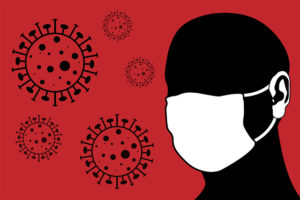Information About the Virus:
The Center for Disease Control (CDC) frequently provides updates on the most recent information scientists have learned about Caronavirus that causes COVID-19 disease. They also provide scientifically based ways to keep yourself and your family safe during the pandemic. Please visit the CDC website to stay informed.
The CDC also provides tips for handwashing, disinfecting your home, and use of masks.
The Louisiana Dept. of Health provides data specifically related to COVID-19 in Louisiana. This includes updated information about the number of cases and suggestions for steps the public can take to maintain safety.
 Tips for the Public:
Tips for the Public:
Wellness and Coping:
LPA has developed a document called Staying Well Under Stress with tips for managing the stress of COVID-19 and promoting adaptive coping strategies.
The American Psychological Association (APA) has a COVID-19 Information and Resources page, which is continually updated for psychologists, health-care workers, and the public.
Staying updated is important, but too much media exposure can cause undue stress and anxiety. APA has provided tips for Viewing Coverage of Coronavirus which can assist with reducing anxiety around media coverage.
Most of all, remember that the current pandemic is temporary. Psychology Today has published an article highlighting some ways that we can navigate the situation with wellness in mind.
The Department of Veterans Affairs (VA) National Center for PTSD has provided information sheets on managing stress for the public, providers, health care workers, and community leaders.
Resources for Kids:

Talking to Kids about Coronavirus and COVID-19 is a helpful strategy to reduce anxiety. Kids and adolescents are often much more fearful of what they don’t know and it is better to explain, even difficult concepts, than to leave them in the dark. Always make sure to explain information at an age-appropriate level and give them opportunities to ask questions. The National Child Traumatic Stress Network has provided a Guide to Helping Families Cope with Coronavirus.
Zero to Three also has tips for talking to very young children about the coronavirus.
Dr. Anna Long, a school psychology professor at LSU, has provided tips about helping kids manage stress associated with COVID-19.
Keeping children’s minds and bodies active is also important at a time when there are more limited options. Here are some Simple Activities for Children and Adolescents.
A new children’s book by Ana M. Gomez called The Story of the Oyster and the Butterfly: The Coronavirus and Me is also helpful to assist children with understanding what is happening in the world and assist with coping.
Strategies for Healthcare Workers and First Responders:

The COVID Trauma Response Working Group has resources and advice for:
• Sustaining staff well-being in critical care
• COVID-19 & Mindfulness: Resources for Health & Care Staff
• Looking after doctors’ mental well-being
• Managing healthcare workers stress associated with the COVID-19, and
• Psychological First Aid among a number of others.
The Academy of Medical Royal Colleges also has many resources, with particular guidance on Managing Stress and Burnout and Staying Safe & Well: A Self Care Guide for Staff looking after Patients with Coronavirus, which both address needs of healthcare staff directly.
Resources for Psychologists:
Managing your Practice and your Business
 Resources for Tele-Psychology:
Resources for Tele-Psychology:
The American Psychological Association (APA) has opened its telehealth content to everyone, including content which is usually only available to APA members. APA has multiple webinars available free of charge, guidelines for the practice of telepsychology, and resources for managing stress during the COVID-19 crisis.
• APA Telepsychology webpage
• Guidelines for the Practice of Telepsychology
• Guidance on Psychological Tele-assessment
• Tips for Connecting with Children and Adolescents Via Telehealth
Choosing a Platform:
• Guidelines on Choosing Telepsychology Platforms
• APA has provided a comparison of several platforms
• Below are telepsychology platforms recommended by colleagues in Louisiana:
Zoom for Healthcare
Doxy.me
Vsee
Thera-LINK
Simple Practice
• The Interorganizational Practice Committee has provided guidance on Telepsychological Assessment
Resources for Business Practice:
Latest Updates from CMS (Centers for Medicare and Medicaid Services) telehealth policies and Billing Information
(Updated April 6, 2020):
CMS is temporarily waiving key telehealth requirements to allow Medicare beneficiaries to receive services from their homes with fewer restrictions. Please review the summary of current guidelines and billing codes. Information is also included regarding when audio only sessions can be billed and the codes to use.
Accelerated or Advanced Payments for Medicare Providers:
CMS has announced that it will provide accelerated and advance payments for Medicare participating providers. Accelerated and advance Medicare payments provide emergency funding and address cash flow issues based on historical payments when there is disruption in claims submission and/or claims processing. Medicare will begin accepting and processing these payment requests immediately. CMS anticipates that the payments will be issued within seven days of a provider’s request. Please review the informational fact sheet on the accelerated/advance payment process and how to submit a request.
Commercial Insurance Company Policy/Billing Information:
• Aetna
• Blue Cross of Louisiana Telehealth Policies during COVID 19
• Beacon Health
• Humana
• Magellan Behavioral Health
• United Health Care
• United Behavioral Health/Optum
APA Guidance for Small Businesses:
APA has developed guidance and resources about small business loans that psychologists may qualify for under the CARES act. APA has a new Practice Information Hub that provides updated information on a myriad of topics that may be of value to psychologists. The Practice Information Hub provides detailed information on the following programs:
• SBA loan assistance under the CARES Act.
• Paycheck Protection Program
• Economic Injury Disaster Loan Advance
• SBA Express Bridge Loan
• Small Business Debt Relief Program

